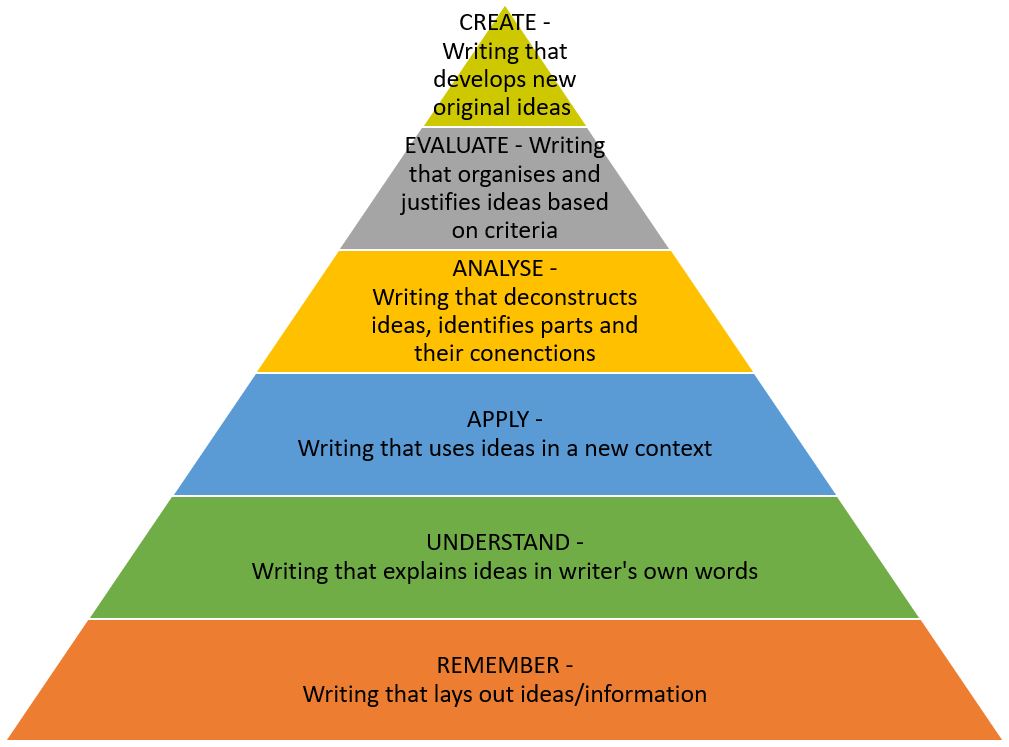EXPERT VOICES
The writing levels pyramid: a framework for high-quality academic writing
10 December 2024 – Vol 2, Issue 4.
Writing an outstanding academic paper requires imagination, critical thinking, and self-awareness. These qualities enable writers to produce innovative works that contribute something new to knowledge. But how can we easily describe this level of writing? How can we explain or measure it, and differentiate it from basic-level writing?
I am proposing the Writing Levels Pyramid – a framework for assessing and explaining the competencies required at the different academic writing levels, based on Bloom’s cognitive domains:

The Writing Levels Pyramid.
The writing proficiency, at each level:
| Domain | Achievement | Expected in stage | Writing result | Competency (knowledge, skills, behaviours) |
| Creating. | Realise a new product, approach or idea. Produce new or original work. |
PhD and above. |
Writing that synthesizes diverse concepts and generates new ideas, thoughts, and approaches – or offers new original ideas not synthesized or known before.
|
Innovation. Originality. |
| Evaluating. |
Justify a decision according to a criterion or a standard.
|
MPhil. |
Writing that critically judges various perspectives, logically organises them and provides arguments based on defined criteria.
|
Judgment. Justification of decisions. |
| Analysing. | Disassemble components and define their relationships. Draw connections among ideas. |
Postgraduate – MA. |
Writing that deconstructs complex ideas or structures, identifying parts/concepts and defining clear relationships between them. Analytical depth and clarity, with each point logically building on the previous one.
|
Deconstruction. Identification, drawing relationships. |
| Applying. | Use information in a new way, or in new situations. | Undergraduate – BA. | Writing that redevelops existing data/concepts into new context. A practical application of theories. |
Implementation. Re-use. |
| Understanding. | Reformulate a concept. Explain an idea. | School. |
Writing that restates concepts in the writer’s own words.
|
Comprehension. Re-telling. |
| Remembering. | Retrieve, recognise or memorise information. | First school years. |
Factual writing that lays out basic information without analysis, interpretation or critical reflection.
|
Recall. Saying. |
Writing Mastery Table, mapped to Bloom’s categories.
The levels are like a ladder, where each step builds on the previous one, however all levels can exist at any age, as they are not strictly tied to a person’s stage of life. Naturally in life, you will be surprised by people. You may find high-level critical thinking in small children, as they come up with incredible insights that surprise adults. Children do not just recall or understand data (on the basic levels) but create new ideas and share new perspectives (PhD-level), even if they may not have the vocabulary or grammar to write a PhD-level thesis.
To be able to identify the levels, we can use ‘measurable verbs’ for each category. You can use these verbs when instructing students to write at each level. Also, when assessing written texts, these verbs can help you identify at what level the writing is. For example, did the author compose, generate, or formulate ideas? – if so, then the writing is on the ‘creating’ level.
| Category | Measurable verbs |
|
Creating. Generate new solutions. |
Categorise, combine, compile, compose, create, devise, design, generate, modify, organise, rearrange, relate, reorganise, revise, invent, predict, plan, construct, imagine, propose, formulate, hypothesise.
|
|
Evaluating. Make judgements based on evidence found. |
Appraise, compare, conclude, contrast, criticise, critique, defend, describe, discriminate, evaluate, explain, interpret, justify, relate, summarise, support, assess, rank, test, measure, recommend, judge, appraise.
|
|
Analysing. Break down information to look at relationships. |
Break down, compare, contrast, make diagram, deconstruct, differentiate, discriminate, distinguish, identify, illustrate, infer, outline, relate, select, separate, connect, arrange, solve, categorise, classify, explain.
|
|
Applying. Use knowledge in different situations. |
Change, compute, construct, demonstrate, discover, manipulate, modify, operate, predict, prepare, produce, relate, show, solve, use.
|
|
Understanding. Translate and interpret knowledge. |
Comprehend, convert, defend, distinguish, estimate, explain, extend, generalise, give an example, infer, interpret, paraphrase, rewrite, summarise, translate, associate, differentiate, discuss, recognise, review, locate.
|
|
Remembering. Retain, recall and recognise knowledge. |
Describe, identify, know, label, list, match, name, outline, recall, recognise, reproduce, select, state, tell, show, collect, record, underline.
|
> To assist you with constructing your thesis, see:
At a Glance:
Writing Levels: Remembering (recalling facts), Understanding (interpreting ideas), Applying (using knowledge practically), Analysing (identifying patterns), Evaluating (assessing based on criteria), Creating (new concepts).
© Journal of Creativity and Inspiration.
Gil Dekel is a doctor in Art, Design and Media, specialising in processes of creativity and inspiration. He is a lecturer, designer, visionary artist, Reiki Master/Teacher, and co-author of the ‘Energy Book’. He was awarded the Queen Elizabeth II Platinum Jubilee Coin, in recognition of his dedication and commitment to pastoral work in the UK.
